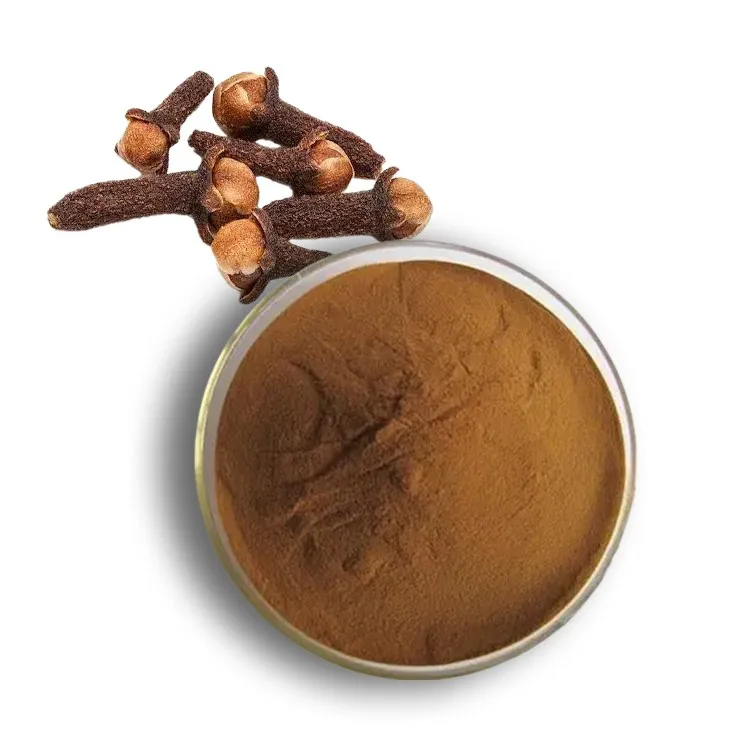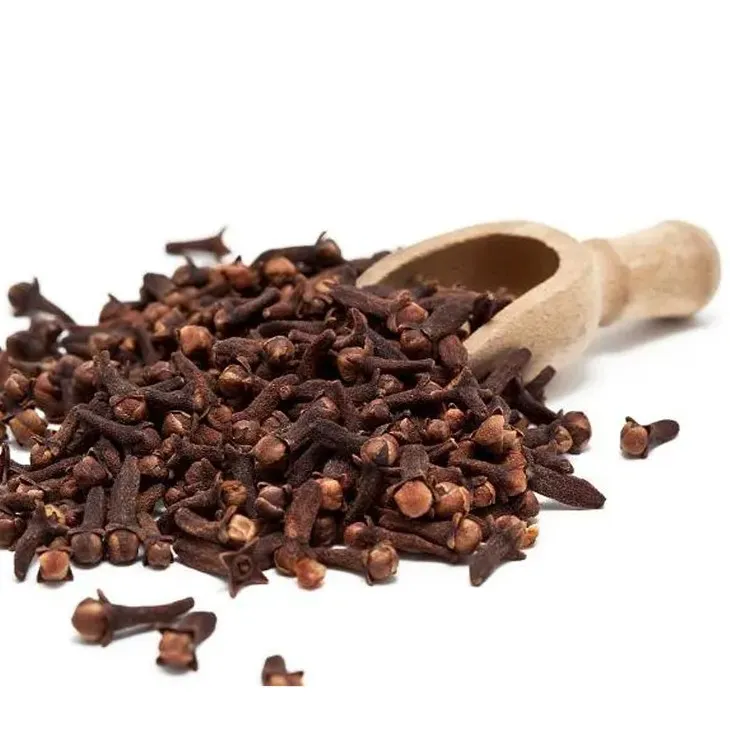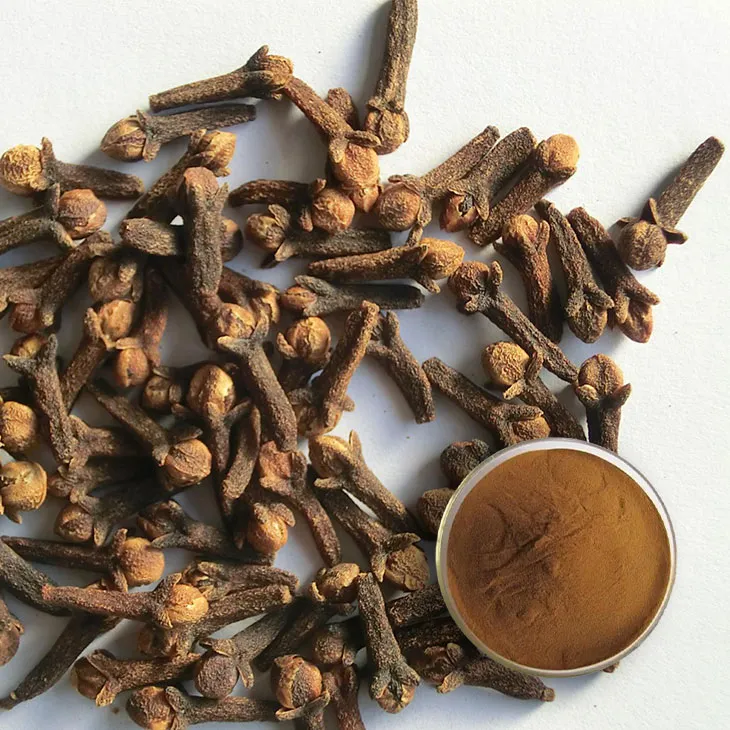- 0086-571-85302990
- sales@greenskybio.com
Organic Clove Powder with Trace Components.
2024-11-29

1. Introduction
Organic Clove Powder, especially when enhanced by trace ingredients, has emerged as a fascinating subject in the realm of food, flavor, and cultural studies. Clove, a well - known spice, has been used for centuries across different cultures for its unique flavor, aroma, and potential health benefits. The addition of trace components further enriches its complexity, making it a topic worthy of in - depth exploration.

2. Chemical Makeup of Organic Clove Powder
Eugenol: The most prominent component in Clove Powder is eugenol. This phenolic compound is responsible for much of the characteristic warm, spicy, and slightly sweet flavor of cloves. It has a chemical formula of C10H12O2. Eugenol is not only important for the flavor profile but also has antimicrobial and antioxidant properties.
Carvacrol and Thymol: In addition to eugenol, small amounts of carvacrol and thymol may be present as trace components. These compounds also contribute to the overall flavor complexity, adding earthy and herbal notes. Chemically, carvacrol has the formula C10H14O, and thymol is C10H14O as well.
Flavonoids: Organic clove powder also contains flavonoids in trace amounts. Flavonoids are a diverse group of polyphenolic compounds that play a role in antioxidant activity. Some of the flavonoids found in cloves include kaempferol and rutin. These compounds contribute to the potential health - promoting effects of clove powder.

3. Role of Trace Elements in Flavor and Aroma
3.1 Flavor Enhancement
The trace elements in organic clove powder work in harmony to enhance the overall flavor. For example, the presence of carvacrol and thymol, even in small quantities, can add depth and complexity to the basic eugenol - dominated flavor of cloves. They can create a more nuanced taste experience, which is highly valued in culinary applications.
When used in baking, the trace elements interact with other ingredients such as flour, sugar, and butter. The complex flavor profile of the clove powder can cut through the sweetness and richness of baked goods, providing a balanced and inviting flavor. In savory dishes, the trace components add an exotic and warm note, complementing spices like cinnamon, nutmeg, and cardamom.
3.2 Aroma Contribution
The aroma of organic clove powder is also significantly influenced by its trace components. Eugenol has a strong, sweet - spicy aroma, but the presence of other compounds modifies this. The trace elements can create a more rounded and long - lasting aroma. When cloves are used in potpourri or as a natural air freshener, the trace components contribute to a more complex and inviting scent that can linger in the air for a longer time.
In perfumery, the unique aroma of clove powder with its trace elements can be used as a base note or to add a spicy, warm undertone to a fragrance blend. The combination of eugenol with the other trace components provides a distinctiveness that is difficult to replicate with single - compound fragrances.

4. Applications in Different Cultures
4.1 Asian Cuisine
In Asian cultures, particularly in Indian cuisine, organic clove powder is a staple spice. It is used in a variety of dishes, from rich curries to fragrant rice preparations. In Indian curries, the trace - enhanced flavor of clove powder adds depth to the complex blend of spices. It is often combined with coriander, cumin, and turmeric to create a harmonious and flavorful dish.
In Chinese cuisine, cloves are used in some traditional meat dishes, especially those with a slow - cooked or braised preparation. The trace components in the clove powder contribute to the overall umami flavor and aroma of the dish, enhancing the taste of the meat and the richness of the sauce.
4.2 Middle Eastern Cuisine
Middle Eastern cuisine also makes extensive use of clove powder. In dishes like tagines in Moroccan cuisine, the spice is added to create a warm and inviting flavor. The trace elements in the clove powder blend well with other spices such as saffron, cinnamon, and ginger, giving the dish a unique and exotic taste. In Middle Eastern sweets like baklava, a small amount of clove powder can be added to the nut and honey filling to add a touch of complexity to the sweet flavor.
4.3 European Cuisine
In European cuisine, particularly in holiday baking, clove powder is a common ingredient. In gingerbread cookies, for example, the trace - enhanced clove powder adds a warm, spicy flavor that is characteristic of the holiday season. In mulled wine, cloves are used to infuse the wine with a spicy aroma and flavor, and the trace components contribute to the overall complexity of the drink.
5. Health Benefits Associated with Organic Clove Powder
Antimicrobial Properties: Thanks to eugenol and other trace components, organic clove powder has antimicrobial properties. It can help inhibit the growth of bacteria, fungi, and viruses. This makes it potentially useful in natural preservatives or in traditional medicine for treating infections.
Antioxidant Activity: The flavonoids and other phenolic compounds in clove powder act as antioxidants. They can help neutralize free radicals in the body, which are associated with various diseases and aging. Regular consumption of foods containing clove powder may contribute to overall health and well - being.
Anti - Inflammatory Effects: Some studies suggest that the compounds in clove powder may have anti - inflammatory effects. This could be beneficial for conditions such as arthritis or other inflammatory disorders, although more research is needed to fully understand the mechanisms and potential applications.
6. Conclusion
Organic clove powder with trace components is a multi - faceted ingredient with a rich chemical makeup, significant contributions to flavor and aroma, and diverse applications across different cultures. Its potential health benefits also add to its allure. As research continues, we can expect to learn more about the precise roles of these trace components and how to best utilize this unique spice in various fields, from cooking to health - promoting products.
FAQ:
What are the main chemical components in organic clove powder?
Organic clove powder mainly contains eugenol, which is a significant compound responsible for its characteristic flavor and aroma. It also has other components like acetyl eugenol, β - caryophyllene, and vanillin in smaller amounts. These components work together to give the clove powder its unique properties.
How do trace elements in organic clove powder affect its flavor?
Trace elements in organic clove powder can enhance and modify its flavor. For example, certain minerals might interact with the main chemical compounds like eugenol. They can either intensify the spicy and warm flavor notes or add subtle undertones that are difficult to achieve without their presence. These trace elements contribute to the overall complexity and depth of the flavor profile.
What role do trace components play in the aroma of organic clove powder?
The trace components in organic clove powder play a crucial role in its aroma. They can act as boosters or modifiers of the main aroma - contributing compounds. Some trace elements might have a synergistic effect with eugenol in terms of aroma release. They can also introduce additional floral or earthy nuances to the otherwise dominant spicy - sweet aroma of the clove powder.
How is organic clove powder with trace components used in culinary in different cultures?
In Indian cuisine, organic clove powder with trace components is used in spice blends like garam masala. It adds a warm, spicy flavor to curries and rice dishes. In Middle Eastern cooking, it is often used in meat preparations, such as in kebabs, to enhance the flavor. In European baking, it can be found in gingerbread and some fruitcakes, contributing a distinct spicy aroma and flavor.
Are there any health benefits associated with the trace components in organic clove powder?
Some trace components in organic clove powder may have potential health benefits. For example, certain minerals might contribute to overall well - being. Eugenol, which is a major component along with the influence of trace elements, has been studied for its antioxidant and antimicrobial properties. However, more research is needed to fully understand the specific contributions of the trace components to health.
Related literature
- Analysis of Organic Clove Components and Their Significance"
- "The Role of Trace Elements in Spice Flavor: A Case Study of Clove"
- "Cultural Applications of Organic Clove Powder in Global Cuisines"
- ▶ Hesperidin
- ▶ citrus bioflavonoids
- ▶ plant extract
- ▶ lycopene
- ▶ Diosmin
- ▶ Grape seed extract
- ▶ Sea buckthorn Juice Powder
- ▶ Beetroot powder
- ▶ Hops Extract
- ▶ Artichoke Extract
- ▶ Reishi mushroom extract
- ▶ Astaxanthin
- ▶ Green Tea Extract
- ▶ Curcumin Extract
- ▶ Horse Chestnut Extract
- ▶ Other Problems
- ▶ Boswellia Serrata Extract
- ▶ Resveratrol Extract
- ▶ Marigold Extract
- ▶ Grape Leaf Extract
- ▶ blog3
- ▶ blog4
-
Organic Motherwort Extract Powder Supplier.
2024-11-29
-
The Pure Vitamin K2 Most Worth Buying.
2024-11-29
-
Chinese Hawthorn Extract Powder Suppliers.
2024-11-29
-
The best Tongkat Ali extract in nature.
2024-11-29
-
Chinese Ginger Extract Powder Suppliers.
2024-11-29
-
Kelp Extract Powder
2024-11-29
-
Curcuma Longa Extract/Turmeric extract
2024-11-29
-
Grapefruit Seed Extract Powder
2024-11-29
-
Peppermint Oil
2024-11-29
-
Eyebright Extract
2024-11-29
-
Hedyotis Diffusa Extract
2024-11-29
-
Lycopene
2024-11-29
-
Gynostemma pentaphyllum extract
2024-11-29
-
Alisma Extract
2024-11-29
-
Troxerutin
2024-11-29





















